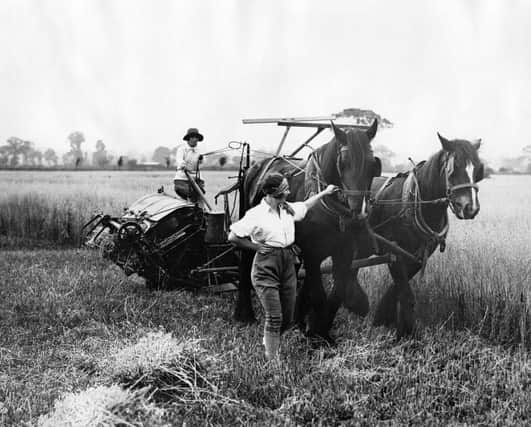Free Trade could take us back to Hungry Years - Andrew Arbuckle


The usefulness of these records is largely limited to comparisons with previous years so that the writer can claim this year’s harvest started two weeks earlier than last year or the price of wheat is xx pounds per tonne more than it was 12 months ago.
My grandfather kept a diary and I recently spent an afternoon flicking through the pages relating to the late 1920s and early 1930s and this is where it became interesting, and possibly even relevant to the present day.
Advertisement
Hide AdAdvertisement
Hide AdOne entry in the 1930s, an era that later became known in the farming world as the Hungry Years, saw him returning from a visit to the local market in Cupar where he was offered good quality oats imported from Germany at xx per quarter. This did not go down well with him as one of his intentions for going to market had been to sell his own oat crop, which was still sitting in stacks in the yard.
He did not mention it in the diary, but this was less than 20 years after the bloodiest conflagration the world had ever known. Later it was called World War One, in which the Germans and the British had spent four years lobbing tonnes of shells and billions of bullets at each other, killing and maiming millions in brutal warfare.
Farmers in this country who had supplied vital foodstuffs throughout the war were, shortly after the fighting finished, relegated in importance. The post-war politicians encouraged exports of industrial plant and machinery to all corners of the globe. Among their trading partners was cash-strapped Germany, who partly paid for the equipment they received with grain. This was known by elected representatives as Free Trade but it was also known by farmers by a less complimentary term as they saw the value of their produce undercut by imports from across the world
This brings us to the present-day, post-Brexit world in which import barriers are being torn down and Free Trade is once again the in-thing. Last week, the National Farmers Unions both North and South of the Border and the National Sheep Association expressed deep concerns over the implications of the latest deal. This particular one is with New Zealand, which is one of the world’s largest producers of sheep meat, lest anyone has forgotten that fact. The door is now open for sheep meat and other agricultural produce to be imported in ever increasing quantities, with tariffs or controls melting away in the coming years.
It follows a similar agreement with Australia and precedes a likely future deal with the United States. Other agreements are in the pipeline as the politicians currently running the country attempt to fill trade gaps caused by leaving the EU.
So far, all the deals seem to be based on opening up this country to more imports of food. As the NFUS pointed out at their recent annual meeting this country is already producing a smaller percentage of the food needed for the people who live here than it has ever done.
It is hard to escape the conclusion that far from the sunlit uplands for farmers promised by the Brexiteers, this country will be looking at a farming industry run on a reduced scale.
Advertisement
Hide AdAdvertisement
Hide AdIt will also be a country more vulnerable to the vagaries of world prices and availability of food than has been the case for most of the last century. Today’s politicians promoting Free Trade will be long gone, either to their Mediterranean holiday villas or clothed in ermine in the House of Lords by the time the full effects of Free Trade hit home.
By living through to the mid-1940s, my grandfather survived long enough to see the folly of Free Trade as the Second World War once again stressed the importance of having food security well up on the agenda. This is no call through rose-tinted glasses for a return to the past, but a warning that farming is now very exposed to market swings; some will bring short term benefits, others long term losses.
A message from the Editor
Thank you for reading this article. We're more reliant on your support than ever as the shift in consumer habits brought about by coronavirus impacts our advertisers. If you haven't already, please consider supporting our trusted, fact-checked journalism by taking out a digital subscription. Click on this link for more information.
Comments
Want to join the conversation? Please or to comment on this article.